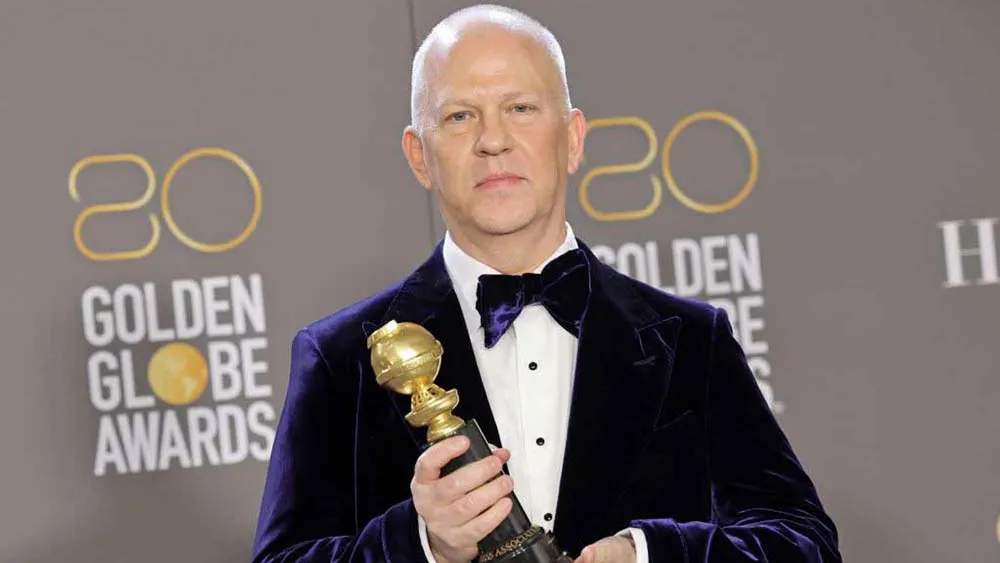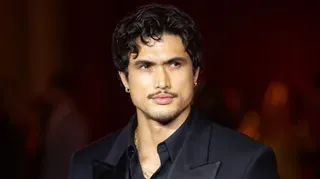October 11, 2004
After Hours With Elaine Stritch
Robert Nesti READ TIME: 12 MIN.
If you saw the Emmy Awards last month you saw Elaine Stritch in rare form.
The moment came when it was announced that Stritch beat Ellen DeGeneres, Billy Crystal, Tracey Ullman, and Bill Maher for Outstanding Individual Performance In A Variety Or Music Program. She won for her HBO documentary ?Elaine Stritch at Liberty,? a behind-the-scenes look at her one-woman show from its first rehearsals through its closing night in London. And when the Daily Show?s John Stewart announced her name it was like a bolt of electricity went through her seat. ?Oh Shit,? she appeared to say.
?And look at the company I?m in,? she said addressing the audience once onstage. ?Just look at. And I?m so glad none of them won. I?m so glad none of them won. I won. I can hardly take a compliment. I?ve got a problem. Tonight. Be my guest. I am so happy.?
The compliments have been coming at a healthy clip for the 78 year old performer since she first began performing her autobiographical one-person show ?Elaine Stritch At Liberty? at New York Public Theater 3 years ago. It was an immediate sensation, prompting a move to Broadway the following Spring and the opportunity for the actress to win, incredibly enough, her only Tony Award. ?Ah, at long last, a genuine, heart-racing love story has arrived on Broadway,? wrote Ben Brantley in the New York Times. ?This is a bona fide tale of passion, tears and the kind of ecstasy that comes from endorphins flooding the nervous system.?
The love story, though, was a long time coming, and it nearly didn?t happen due to her addiction to alcohol.
?It almost all happened without me,? she explained recently from her apartment late one night at the Carlyle Hotel. ?I drank because I was scared, and when you?re scared, you try to find an antidote. And, boy, did I ever.?
It was nearing midnight and Stritch was just starting to unwind.
?I always feel that when I have these late night interviews that I have some secret lover that calls me late at night and we make elicit plans to meet,? she joked. ?I have a great fantasy mind. To live the kind of live I do, I would have to.?
What she wanted to talk about, though, was her alcoholism.
?The opposite sex led me to drinking,? she recalled. ?Because I was so scared. I was okay as long as I could be a clown and make the kids laugh at school; but when I noticed the boys, and they noticed me; I couldn?t do that sober. That was a discovery. Drinking gave me the confidence in spades. I use to joke that when I went out drinking and went to the ladies room, I got better looking.?
The show, which comes to the Wilbur next week for a two-week run, follows Stritch from her childhood in a Detroit suburb to her early days in New York, where she lived with nuns while attending acting school with Marlon Brando (whom she dated, disastrously.) From there came Broadway, first in a musical revue called ?Angels in the Wings,? then understudying Ethel Merman in ?Call Me Madam.? Featured roles in ?Pal Joey,? ?On Your Toes,? and ?Bus Stop? led to her getting a movie contract and a supporting role in ?A Farewell to Arms? opposite Rock Hudson, whom she briefly dated in while filming in Rome.
Returning to the States she danced with a gorilla in a musical called ?Goldilocks,? and starred in a musical called ?Sail Away? that Noel Coward wrote for her. In 1970 she played Joanne, the acerbic society matron in ?Company,? for which Stephen Sondheim provided her with a signature song (?The Ladies Who Lunch.?) She played hard-drinking women in acclaimed dramas by Edward Albee (Martha in ?Who?s Afraid of Virginia Woolf?? and Claire in ?A Delicate Balance;?) and in 1994 she took a featured role in Harold Prince?s celebrated revival of ?Showboat.? Local audiences may recall her at the American Repertory Theatre in 1993 when she gave an artful impersonation of Lillian Hellman in ?Cakewalk.? The play was forgettable, but Stritch was not.
Like Carol Channing, she?s one of the last great Broadway stars of its Golden Age; yet she isn?t one to let the parade pass her by. She?s restless, and was finding it difficult to relax as she took some time off before coming to Boston for the show.
?I have been so active all my life that I find it impossible to sit still and take it easy. I still have to accomplish something every day because I feel that is part of my obligation and my ability.
?It?s a matter of balance,? she continued, ?and that?s the hardest thing to achieve. I have a little thing I say in the morning that serves me very well, and it goes like this: I pray that I may live expectantly, loving the simple things in life. Keeping it light, simple, uncomplicated, and free. Oh boy, that?s a wish and half.?
Stritch came to write ?Elaine Stritch At Liberty? upon the advice of some friends after she spoke at tribute to Judy Garland at Avery Fisher Hall.
?I had been very successful that night talking about my friend Judy Garland, and the audience was hysterical with laughter, as I always was about Judy Garland. And I sang two of her songs reluctantly, because who can sing Judy Garland songs except Judy Garland? But I sang them with adoration ? they were like a dedication to her. For me she was one of the great artists of the 20th century. Unbelievable.?
She paused for a moment.
?Anyway,? she continued, ?John Shrieber came up with me and said, you got to do a show. You connect with an audience talking about yourself, your friends, and your life; and he gave me ?cappuccino money? once a week, if you know what I mean, and I started to go to work. And then we found John Lahr, and he was a godsend because he was the smart guy that told me what to include, and what to exclude. He was an enormous help. And I feel that John Lahr understood me better than almost my mother and father did. That was the kind of relationship we had. I always include this in an interview, and very few people are smart enough to quote it, but he said to me the greatest compliment I could ever hope to get: he said, ?Elaine, you remind me of my father.? And I thought that was glorious.?
Lahr?s father was the great Broadway comic Bert Lahr, who was immortalized as the Cowardly Lion in ?The Wizard of Oz.?
Lahr and Stritch continued to shape the piece, then brought it to director George C. Wolfe, who agreed to mount it at the Public Theatre.
?It was hard to get my experiences on paper, honestly and entertainly, as possible,? she said recalling the process. ?You don?t put your life on stage if it?s not going to be entertaining. Do you know what I mean??
?Writing it was the most grueling work I have ever done in my life,? she continued. ?I?m a talented actress. I?m not going argue with anybody about that. But to be responsible for every word you say up there, and every choice you make ? that?s another ballgame. But it?s given me courage, more self-assurance, and great joy to have taken that risk.?
Did she ever wonder why she was even doing something so difficult and personal at this point in her life?
?Absolutely. The first time I did this in front of an audience was something scary. Because it was all untried. And when it went well, I had an out-of-body experience. I didn?t know what the hell was going on. I just went out and concentrated on my show, my lines, my attitudes, my feelings. I just let it ride, and it worked. It was a great thrill.?
The arc of the show chronicles her experience with alcohol, at one point stressing the relationships with the roles she played and the drinks she associated with each of them. In the show she?s blunt about her drunken behavior recalling being thrown out of various establishments, as well as once drinking Judy Garland under the table.
?Apparently that night I could. I was pretty smart, you know. History tells you that I was smarter than Judy Garland about her drinking. But there are more ways to get over your drinking today than in Judy Garland?s time. I think that if Judy Garland had found the right rehab and fell into the right hands, she was a smart enough girl to sober up. But no one cared enough. I was sorry that I didn?t know her better to help her out, but I was doing the same thing she was. But I didn?t take pills, and all of the stuff that was forced upon her.
?I never got drunk on the stage,? she recalled. ?I never let anybody down. I never missed performances. I was a very clever drinker. But it was very hard for people to trust me in a lead in a play or a musical, because they knew I was a high kicker, and they were nervous about it. And most of the people who were nervous about it were alcoholic. Richard Rodgers was an alcoholic. Noel Coward was alcoholic, but he got over it, at least with me.
?Funny when I finally did stop drinking it wasn?t difficult, because, as the saying goes, I was brought to me knees. I stopped drinking and then got diabetes.?
She?s equally honest about her diabetes as she is about her alcoholism. In the HBO documentary she?s seen taking insulin with a needle in the lobby of the Savoy Hotel; yet her illness hasn?t affected her in performance, save for one instance during the Broadway run when her blood sugar level fell to dangerously low levels.
?It was terrifying. It happened for no reason. I took my blood sugar, had a slug of orange juice as I always do in the wings, and out I went. And I just died there. I didn?t know where I was or what I was talking about. But I knew enough to say that I didn?t feel well, and asked the audience if they could, to wait for me, and I left the stage. It took me 25 minutes to get back into shape. My blood sugar dropped to 31, which is pretty low. So I drank a whole lot of orange juice, but it took some time to come back. But George Wolfe was there that night and he went out and spoke to the audience. And Shirley MacLaine was there too, and she came backstage and was so sweet. She said there only one guy who clapped after 20-minutes, and we just lynched him. That?s some devotion, and some compliment that they sat there and waited for me to start the show again. I would rather it didn?t happen, but as long as it did they showed great support for me. It was thrilling. You could imagine the applause I got at the end of that performance. You know audiences, I don?t want to sound emotional; but they?re the best friends in the world. If you?re doing right by them they are the best supporters ever. They know instinctively. They know how hard you?re working, and they know how badly you want it to be good. They?re just rooters. They?re just great.?
Told that her performance in ?Company? is forever etched in my memory, Stritch?s voice brightened.
?Was I good that night?? she asked. ?That?s some show. We don?t get shows like that anymore. And the tragedy is that Sondheim isn?t writing them anymore. He came to the show, and it?s hard to get a compliment out of Steve; but he thought I was very good. He gave me a note, of course. It was something I did in ?Lady Who Lunch.? I got in the habit of getting away from the way I should have sung it. You know the scream when she says ?I?ll drink to that,? he said that I had forgotten to put the scream in the ?I?ll.? Don?t separate the scream, he told me. Make the scream be part of the line. And he was right. It works much better.?
It was well past midnight, but still Stritch was willing to talk. ?Do you have enough?? she asked.
Why did she want to bring the show to Boston?
?Because we never played Boston, and I love Boston. I was angry that we couldn?t work it out. Now they finally want me to do it at a time that we can; so I?m thrilled to death about it.
?It?s where ?Sail Away? opened. And what memories. I remember staying at the Ritz Hotel; and having lunch with Noel Coward and Arthur Lunt. You can?t do better than that! It?s one of those things, you don?t realize what your life is like until 25 years later; and then you say ?God. I was having a ball.??
While ?Sail Away? played the Shubert, the leading lady?s role was cut and folded into that of Stritch?s, nearly doubling her role in the musical.
?I had to practically learn an entire part overnight, and it was the only time I lost my voice. And Coward got mad at me. He told me that I had 3 beers, and that?s what did it. And I thought, ?Are you crazy?? But I was out of the show one night, and it broke my heart; but I couldn?t talk. The whole thing was so scary. I have wonderful memories of Boston. We played ?Bus Stop? at the Wilbur.?
Stritch paused again, as if lost in a reverie.
?You know there are a lot of people I?d love to sit down and have coffee with again. Kim Stanley (her co-star in ?Bus Stop.?) I?d kill to have lunch with Kim Stanley. Jason Robards. Dirk Bogarde. Noel Coward. John Gielgud. Holy Shit. Oscar Hammerstein. Because I loved him. I think his lyrics are so brilliant and sweet and old-fashioned and square and modern. Richard Rodgers. I would have loved to have known him when he wasn?t drinking and I wasn?t drinking.?
Today, though, she?s concentrating on returning to the show she?s done for hundreds of performances, but must essentially learn all over again.
?I have to rehearse a good 4 or 5 hours a day. I have to really go over it and crash like for an exam, so to speak. But it does come back. I do my lines instead of counting sheep, if you know what I mean. But when a curtain comes down on a play, you couldn?t get me to quote one line from it. Unless it?s ?Jesus H. Christ. What a dump!? Then beyond that in ?Virginia Woolf? I couldn?t tell you one line. ?A Delicate Balance? not one line. ?Showboat,? I couldn?t tell you one line. A couple of lines from ?Company? because they?re so memorable like ?she?s tall enough to be your mother.? If someone asked me to do ?A Delicate Balance,? I?d have to start all over and learn it again. Because as soon as I?m out of there, I?m finished with it. It?s gone out of my head.?
How does she keep up her stamina to perform?
?I look after myself. I take care of myself. If have good genes. If I didn?t have diabetes, I?d probably live forever. My mom and dad died at 95 and 96. That?s encouraging. I feel good, and I look after myself. I walk a lot. I exercise. I eat the right kind of foods.?
Does she go out to the theater much these days?
?Oh, God. Listen,? and she paused. ?Like I really feel like seeing ?Wicked.? You know what I mean, don?t you? I hear that ?Aida? is closing, and I say ?Oh, dear. What a shame!? I wish I could see a good play. I?m going to see ?I Am My Own Wife.? Today the best things are playing off-off-off-off Broadway. You have to go to some of these shithouses to see something good.?
Where does she think her straight-talking style come from?
?I think that was instilled in me in confession as a Catholic. I was born and raised a Catholic. I don?t know. That may have something to do with it. . . I?ve always believed in spilling the beans, and telling people how it is. The truth is much more interesting than a lie or a pretense. I?m hung-up on getting rid of secrets?
Asked if she had ever heard from Brando, who died just weeks before the interview, she said she saw him on a set in Hollywood, but they never spoke.
?I think he had a tragic life. He had a lot of secrets. You get fat having secrets. It?s true. Say what?s on your mind and you?ll stay thin. Look at me.?
Stritch then paused and wondered aloud why anyone would be interested in her enough to pay money to see her on the stage.
?I?m always surprised at people being interested in anything about me. But I have to say, I?m getting better at it in the autumn of my life. And it is high time. I?m gentler with myself, and I give myself a little more credit than I use to. I?ve always been extremely hard on myself.
?You know it almost all happened without me. I was in such a state of fear, it was hard for me to enjoy anything. Anytime the curtain comes down and you step forward and they scream and holler ? my God. It?s hard to explain how wonderful that is. Knowing that my play that I do about my life worked is probably a high point of my life. I?ve had so many highs, it?s hard to pick one. I wish I had one that was really special.?
Performances of ?Elaine Stritch at Liberty? run October 19 ? 31, at the Wilbur Theatre, 246 Tremont St., Boston, MA. Performances are Tuesday ? Saturday at 8 p.m. (note Wednesday, October 20th at 7 p.m.) and Sundays at 3 p.m. Tickets are priced from $27.50 -- $67.50; and are available at the box office, online at www.broadwayinboston.com, or by calling Ticketmaster at (617/508/781/978 area codes) 931-2787.
Robert Nesti can be reached at [email protected].







